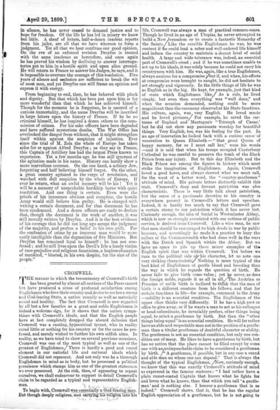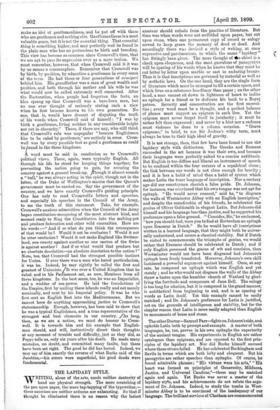CROMWELL.
THE manner in which the tercentenary of Cromwell's birth has been greeted by almost all sections of the Press cannot but have produced a sense of profound satisfaction among Englishmen who love their country and desire to see her a strong "and God-fearing State, a nation morally as well as materially sound and healthy. The fact that Cromwell is now regarded by all but a few fanatics as a great and noble Englishman is indeed a welcome sign, for it shows that the nation sympa- thises with Cromwell's ideals, and that the English people have at last completely dropped the absurd delusion that Cromwell was a canting, hypocritical tyrant, who in reality cared little or nothing for his country or for the cause he pro- fessed, and merely wished to further his own selfish aims. In reality, as we have tried to show on several previous occasions, Cromwell was one of th most typical as well as one of the greatest of Englishmen. There is hardly a good and sound element in our natio 1 life and national ideals which Cromwell did not represent. And not only was he a thorough Englishman in mind as in body, but he possessed a political 'prescience which stamps him as one of the greatest statesmen we ever possessed. At the risk, then, of appearing to repeat ourselves, we shall endeavour to support in detail Cromwell's claim to be regarded as a typical and representative English- man. ._...-- _ ..) i_...... To begin with, Cromwell was essentially a God-fearin man. But though deeply religions, and carrying his recv"...inio . mto his life, Cromwell was always a man of practical common-sense. Though he lived in an age of Utopias, he never attempted to build a New J erusalem or to create a fantastic Monarchy of the Saints./ Like the sensible Englishman he was, he was content if e could lead a sober and well-ordered life himself and induce the country to maintain a decent level of social health. A large and wide tolerance was, indeed, an essential part of Cromwell's creed ; and if he was sometimes unable to act up to his ideals, it was solely because he could not carry his countrymen with him. He was, again, like a true Englishman, always anxious for a compromise /but if, and when, his efforts at compromise were brought to naught, he did not hesitate to act strongly and vigorously. In the little things of life he was as English as in the big. He kept, for example, just that kind of state which Englishmen like/ As a rule, he lived simply, but even then everything was "well done," and when the occasion demanded, nothing could be more magnificent than the ceremony observed at his State functions. His culture, again, was very English. He loved music and he loved pictures/ For example, he saved the car- toons of 'Raphael and Mantegna's "Triumph of CEesar,' but he did not show any passionate worship for beautiful things. Very English, too, was his feeling for the past. In an age of innovation he looked back with a curious sense of veneration to Queen Elizabeth — " that great Queen of happy memory, for so I must call her," were his words —and it is said that when his troops occupied Canterbury Cathedral he was careful to preserve the tomb of the Black Prince from any injury. But to this day Elizabeth and the Black Prince are among the figures in history which most strike the imagination of Englishmen. Again, Cromwell loved a good horse, and always showed what we must call, for the want of a better word, the " country-gentleman " attitude of mind. His private letters distinctly exhibit this trait. Cromwell's deep and fervent patriotism was also characteristic. There is very little talk about patriotism, but the sense of a passionate devotion to his country - is everywhere present in Cromwell's letters and speeches. Indeed, it is hardly too much to say that Cromwell gave a certain stamp to our patriotism which it has never lost. Curiously enough, the idea of burial in Westminster Abbey, which is now so strongly associated with our notions of public service, is derived from Cromwell. Like a wise man, he saw that men should be encouraged to high deeds in war by public honours, and accordingly he made it a practice to bury the sailors of the Commonwealth who had done well in the wars with the Dutch and Spanish within the Abbey. But we have no space to pile up these minor examples of the English spirit that was within Cromwell. Yet before we turn to the political side op his character, let us note one very striking characteristic/ Nothing is more typical of the best kind of Englishman of gentle blood and breeding than the way in which he regards the question of birth. He never fails to give birth some value ; yet ljp never, as does the foreign noble, regards it as all in all. he Austrian or Prussian of noble birth is inclined to th nk that the man of birth is a different creature from his fellows, and that for certain functions in life—for example, command in the Army —nobility is an essential condition. The Englishman of the upper class thinks very differently. If he has a high post or office to give away, or if he wants a man to act as his colleague or head-subordinate, he invariably prefers, other things being equal, to select a gentleman by birth. But then the "other things being equal" is an essential condition. He will far rather have an able and respectable man not in the position of a gentle- man than a titular gentleman of doubtful character or ability. The gentleman is not an essential condition, but only one con- dition out of many. He likes to have a gentleman by birth, but has no notion that the place cannot be filled except by some ' one with " an (unimpeachable claim to be considered a gentleman by birth. A gentleman, if possible, but in any case a sound and able man on whom one can depend." That is always the thought of the-typical Englishman.fiow, curiously enough, we know that this was exactly Cromwell's attitude of mind as expressed in the famous sentence : "I had rather have a plain russet-coated Captain that knows what he fights for and loves what he knows, than that which you call 'a gentle- man' and is nothing else. I honour a gentleman that is so indeed." Cromwell shows, that is, that he has the regular English appreciation of a, gentleman, but he is not going to make an idol of gentlemanliness, and be put off with those who are gentlemen and nothing else. Gentlemanliness is a most valuable grace, but it is not the essential thing. That essential thing is something higher, and may perfectly well be found in the plain man who has no pretensions to birth and breeding. This view has become so common since Cromwell's time, that we are apt to pass its expression over as a mere truism. We must remember, however, that when Cromwell said it it was by no means a commonplace. Remember that Cromwell was by birth, by position, by education a gentleman in every sense of the term. He had three or four generations of armigeri behind him. His grandfather was a man of great wealth and position, and both through his mother and his wife he was what would now be called extremely well connected. After the Restoration, when people had forgotten the facts, an idea sprang up that Cromwell was a base-born man, but no one ever thought of seriously stating such a view when he first became known to his own generation. No one, that is, would have dreamt of disputing the truth of his words when Cromwell said of himself : "I was by birth a gentleman, living neither in any considerable height nor yet in obscurity." Those, if there are any, who still think that Cromwell's rule was unpopular "because Englishmen like to be ruled by gentlemen," are entirely in error. Crom- well was by every possible test as good a gentleman as could beifound in the three kingdoms.
word must be said in conclusion as to Cromwell's political views. These, again, were typically English. All through his life he stood for keeping things together, for preventing the nation going to Tuin, for securing the country against a general break-up. /hough it almost sounds a "bull," he was always acting in the spirit, though not in the letter, of the Duke of Wellington's maxim that the Queen's government must be carried on. Say the government of the country, and we have exactly Cromwell's guiding principle. One has only to read Cromwell's letters and speeches, and especially his speeches in the Council of the Army, to see the truth of this statement. Take, for example, Cromwell's anxious admonition when the Council of the Army began constitution-mongering of the most abstract kind, and seemed ready to fling the Constitution into the melting-pot and produce federation and other wild enormities. Here are his words :—" And if so what do you think the consequence of that would be? Would it not be confusion ? Would it not be utter confusion? Would it not make England like Switzer- land, one county against another as one canton of the Swiss is against another? And if so what would that produce but an absolute desolation—an absolute desolation to the nation?" Note, too, that Cromwell had the strongest possible instinct for Union. If ever there was a man who hated particularism, it was he. Indeed, he may rightly be called the first and greatest of Unionists. /It was over a United Kingdom that he ruled, and in his Parliament. sat, as now, Members from all three kingdoms. In the best sense, too, he was an Imperialist, and a wielder of sea-power. He laid the foundations of the Empire, first by uniting these islands really and not merely nominally, and next by his Imperial policy. It was he who first sent an English fleet into the Mediterranean. But we cannot here do anything approaching justice to Cromwell's statesmanship. Enough, however, has been said to show that he was a typical Englishman, and a true representative of the strongest and best elements in our country. /As long, then, as we are a nation, we must do honour to Crom- well. It is towards him and his example that English- men should, and will, instinctively direct their thoughts at any moment of trouble and difficulty, just as they did, as Pepys tells us, only six years after his death. He made many mistakes, no doubt, and committed many faults, but these have been set right. The good he did has lasted. Indeed, we may say of him exactly the reverse of what Burke said of the Jacobins,—his errors were superficial, his good deeds were fundamental.























































 Previous page
Previous page